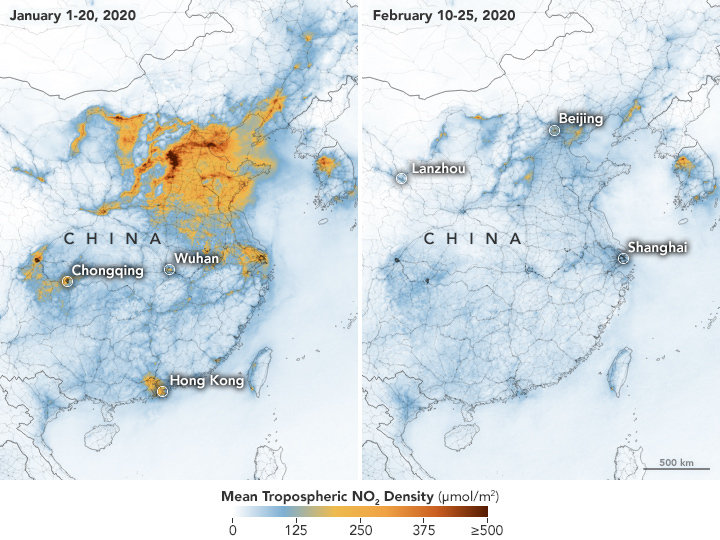Every day new measures are enacted to slow the spread of the coronavirus (COVID-19), and every day more people are asked to practice social distancing or self-isolation.
This sudden and unexpected call to “remain home” is having a variety of effects. Perhaps unsurprisingly, it is having an impact on emissions and other factors linked to climate change, with sweeping alterations to the global “routine” shifting the way we use and consume resources.
So, what happens to climate change when the world slows down? We take a brief look at how changing patterns of resource consumption and waste generation may impact the US over the coming months.
Emissions down — for now
China and Italy offer stark examples of how recent shutdowns have impacted emissions. Among the first European countries to go into lockdown, recent satellite images from the Copernicus Sentinel-5P satellite show a significant reduction of nitrogen dioxide pollution across the Italian peninsula, in particular the industrial northern hub of the country.

Source: businessinsider
Add to this a similar effect seen across China, and the results are significant. Shutting down factories, power plants, and industrial facilities, along with restricting the movement of vehicles and flights has led to a dramatic drop in NO2 emissions with similar reductions reported in CO2 levels.
While this drop is seen as something of a silver lining to an otherwise dire situation, there are concerns that emissions may shift from one place to another, with increasing numbers of people at home depending on individual resources to work and live.
As the US enters a period of increasingly stringent controls, it is difficult to predict exactly what this will mean for emission generation. What is expected, however, is a sharp rise in internet usage, in people heating individual homes, in TV and other appliance usage, and in online shopping for groceries and other essentials that may well offset savings over the longer term.
However, the increase in home deliveries across the country is, at the very least, providing scientists with access to a singular set of data that is unlikely to be replicated in the future. Little is currently known about the emissions associated with the home delivery industry, and as more Americans leave their cars in the driveway to work from home, the shifting patterns of emission generation are providing scientists with insight into a world without internal transit, without international travel, and without industry.
Waste management and recycling
In addition to shifting emission sources, the waste management and recycling industry is likely to experience difficulties as consumption habits change and waste generation concentrates in certain areas. With a huge number of businesses and factories temporarily closed, along with schools and other institutions, waste generation is likely to spike in residential areas, with an increase in the amount of single-use packaging from supermarkets and food deliveries.
An increase in residential waste means more, and more varied, materials to be processed, subsequently placing more extreme measures on waste processing and recycling facilities that may also close or be forced to reduce staff. These concerns are particularly pertinent to an industry still recovering from the shock of China’s ban on waste imports in 2018. As products from multi-material and single-use packaging will increase, it’s now more important than ever to ensure recyclables are clean, sorted, and placed in the proper bins in accordance with local government regulations.
A voluntary slowdown of the economy
As climate change and global health were previously treated as separate issues, there is a strong correlation the two go hand-in-hand.
For economists, scientists, and industry leaders, monitoring and recording the way emissions and waste generation are affected by the Government’s reaction to the virus is a useful tool in the fight against climate change. While these measures and their effects are likely to be temporary, there is hope that the data gathered during this period will allow us to build more robust systems in the future.
RTS serves communities and businesses by providing responsible waste and recycling management, smart-city solutions, and sustainability initiatives. For more information on services in your area, contact us today.


